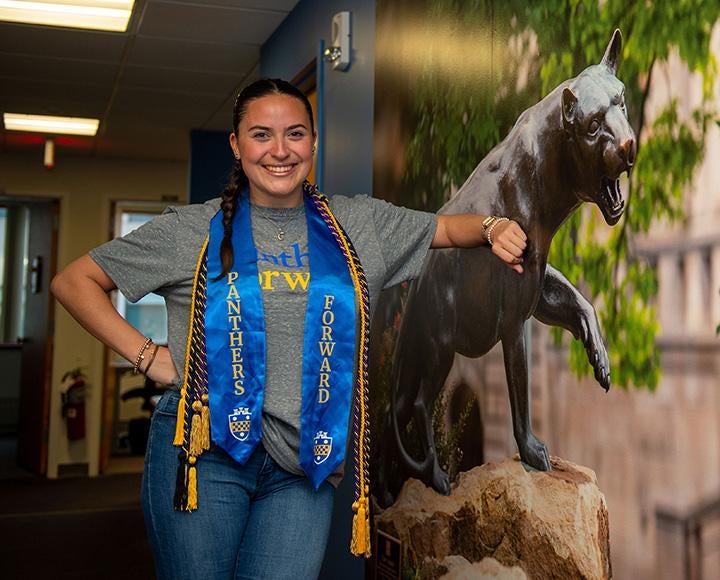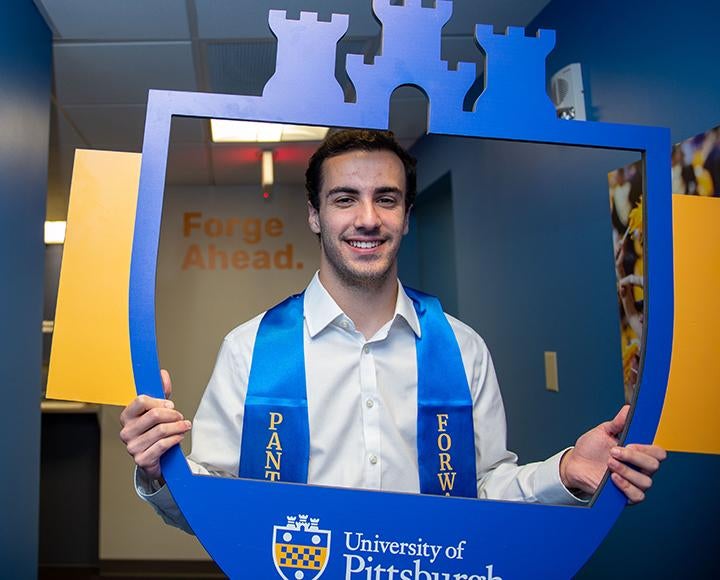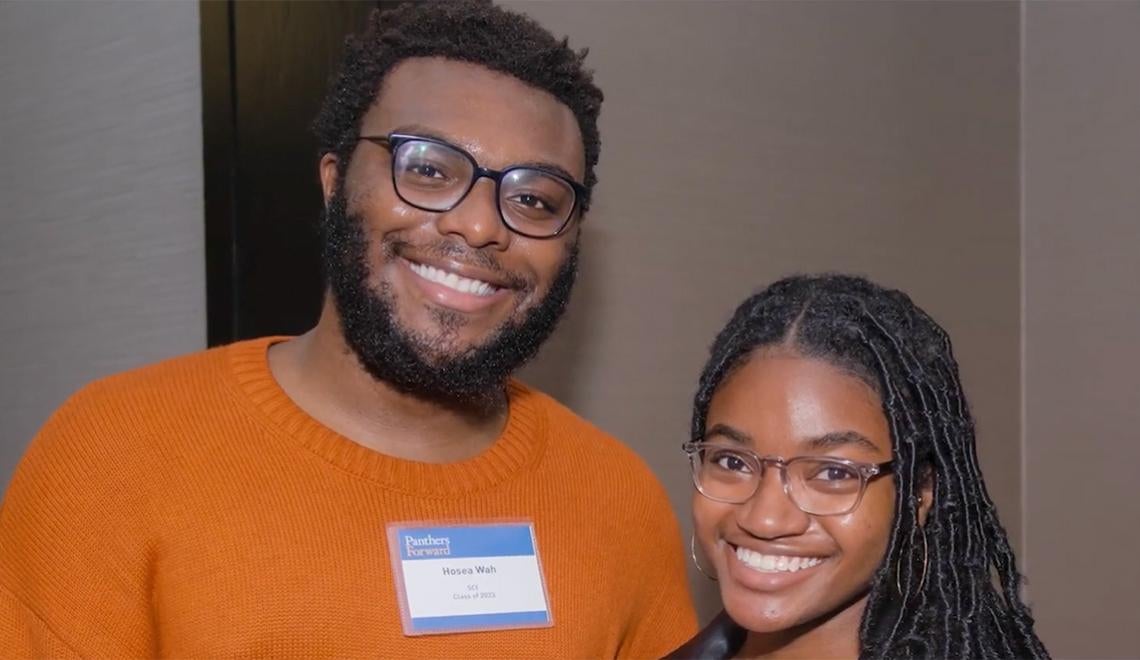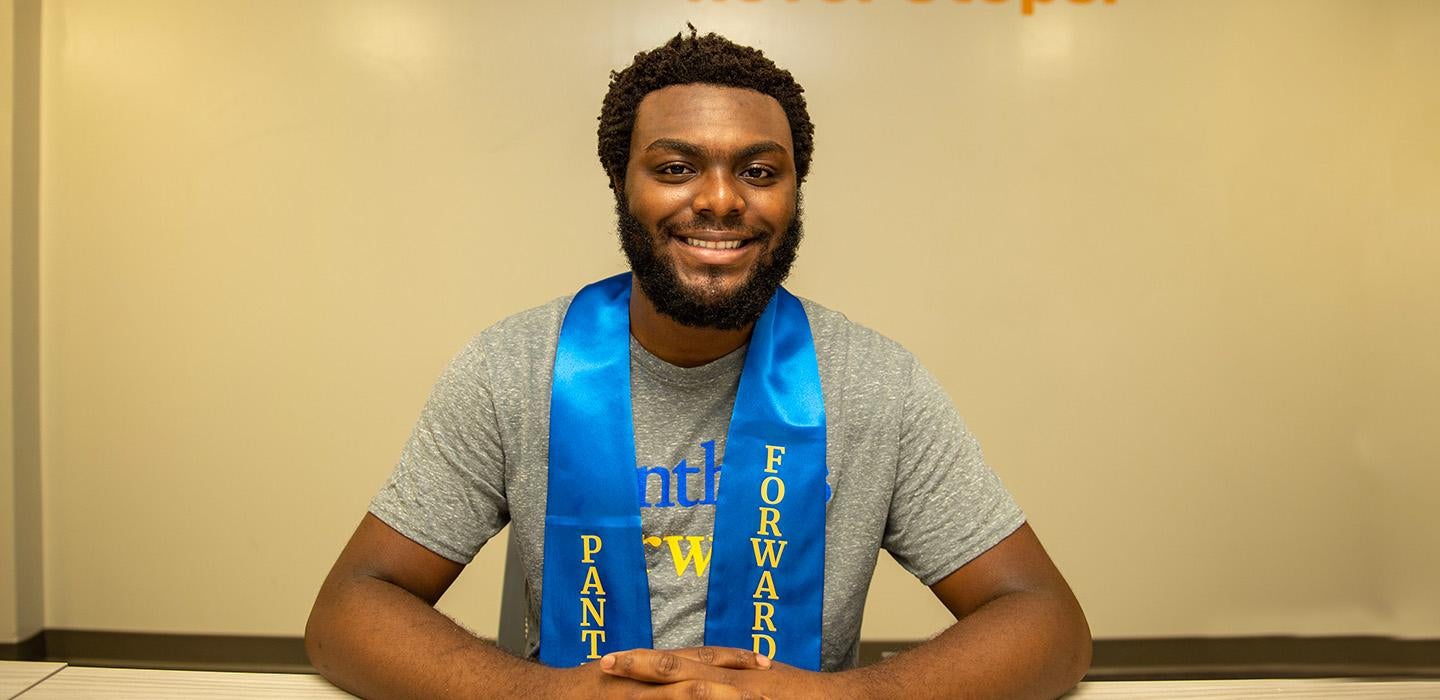
Subscribe to Pittwire Today
Get the most interesting and important stories from the University of Pittsburgh.As a first-generation college student, Hosea Wah had to figure out many things on his own. Thanks to Panthers Forward, student-loan repayment isn’t a challenge he has to navigate himself.
The loan forgiveness, mentoring and financial education program empowers seniors by helping them understand their financial situation, develop a strategic plan to overcome post-graduation economic challenges and provide a support system through a vast network of Pitt staff and graduates.
Recipients receive up to $5,000 in federal student loan debt relief, which over the past five years has amounted to nearly $3.75 million for 750 students. 150 students in the Class of 2023 are set to walk the stage with Panthers Forward sashes on this Sunday.
This program has been especially significant for Wah, who said it represents the support the University of Pittsburgh has consistently provided since the start of his college career.
“I wanted to stay in state,” said the Coatesville, Pennsylvania, native, who attended a 2019 Office of Admissions multicultural event for accepted students of color that introduced him to campus and Pittsburgh. “Seeing the school put on an event for students [like me] who may be coming from an area that’s predominantly Black and Latino to an institution that’s predominantly white was one of the first indicators that I was supported. I felt like I was part of the community and I saw myself here as a student at the University. That’s what really brought me to the University.”
As commencement approaches, Wah said he has been pondering all he’s endured and achieved. While the pandemic during his sophomore year brought challenges, it also pushed him to prioritize the opportunities he wanted to pursue. Panthers Forward was at the top of the list.
“There are many programs that help students get to college [and] throughout college, but they don’t really help students when it’s time to leave,” he said, praising the program’s mentorship services. Amid job interviews and emails about loans, he said: “It’s nice to know that I have that community that I can go to, to talk about those financial things that I may not be able to talk [about] with my parents; being able to get financial assistance, that guidance, knowing that I’m not alone in the process.”


Reflecting on his time at Pitt, the computational social science major and history minor said he’s leaving confident about his financial future and what he wants to pursue a career in education policy and law. He discovered this passion doing a work-study for Jumpstart his first year. The program enables Pitt students to advance equitable learning in underserved Pittsburgh preschool classrooms through programming.
“Jumpstart was really the catalyst,” said Wah. “It was my first introduction to an organization that actually seeks to address many of the discrepancies in the public education system.”
From there, each step he took at Pitt tied back to his desire to change systems. As an Elsie Hillman Honors Scholar, he partnered with the Allegheny Intermediate Unit’s Diversity, Equity and Inclusion Department to plan conventions and trainings. He won a David C. Frederick Summer Public Service Internship Award to intern with the Massachusetts Advocates for Children (MAC), where he addressed racial trauma among Boston Public School youth. He partnered with local youth engagement organizations and spoke with public school students of color ages 14-18 to discuss racial trauma and to develop a resource guide on the topic, which is featured on the MAC website.
Wah credits the support of the institution, and specifically, professors like the School of Education’s Esohe Osai and Shanyce L. Campbell for encouragement and serving as advisors during his funded summer research project with the Office of Undergraduate Research. Supported by the School of Education Justice Scholars Institute Program, he researched the current state of public education systems in Pittsburgh compared to the systems before Brown v. Board of Education and proposed solutions, like the idea that school districts should not have to rely on state and community taxes for funding.
“My experience has been filled with gratitude as a first-generation student with different opportunities and resources that I’ve been able to have, in terms of traveling, connecting with people in different organizations, in different communities — really just being able to find myself,” Wah said.

Despite those accomplishments, it hasn’t been an easy road. He worked part time throughout school to alleviate the expenses that come with being a college student. There also were emotional pressures, knowing many from his community never received the same opportunities, which often left him with feelings of imposter syndrome. Still, he looks back fondly on his time at Pitt and hopes his perseverance will inspire his two younger sisters and others from his community.
“I will say that I feel like there’s nothing more I could have done. I think I’m in a moment of reflection right now. I really exhausted all my resources. The loans that I took out, I don’t regret the investment ”
Wah intends to return to Coatesville as he applies for law school and hopes to work in admissions for a local university during his gap year. In this space, he envisions having the ability to make the greatest impact on students the way he was impacted during his first trip to Pitt.
“It’s something I’m passionate about,” he said. “I’ve had the opportunity to really introduce students to our community, to different aspects of their academic careers, whether that’s going from preschool to kindergarten or high school to college. I think it would be very fulfilling and the next logical progression for me to introduce students to higher education. Coming to Pitt [I felt] would allow me to branch out into other communities like Homewood and all the different vibes with the different communities, and I was not proven wrong.”
— Kara Henderson, photography by Johnathan Wright


